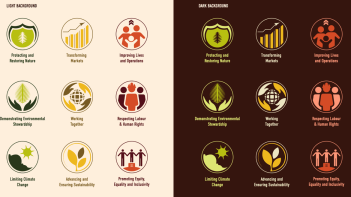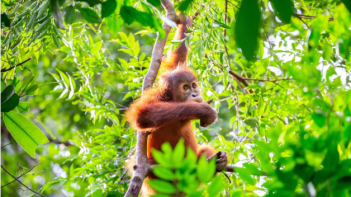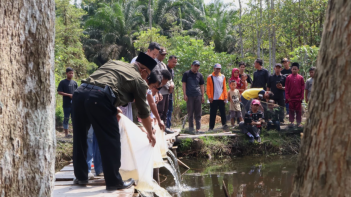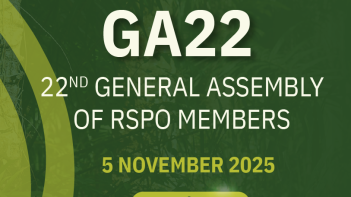Being a working mum has its challenges anywhere in the world. The delicate act of balancing work and family demands is something many women struggle with, but for working mum and palm oil smallholder, Noraziza, her emotional conflict lies between her passion for conservation and potentially doubling her family income.
In Kinabatangan, Sabah, Noraziza and her family rely solely on the income from their 12 acre oil palm plot. Noraziza became RSPO-certified in 2014 and says since then, her yields have increased and the soil condition has greatly improved. However, with three of her children still at school and a total of six family members living under one roof, she admits that the family finances are a concern. One son is studying law enforcement which costs around RM17,000 (USD3700), her daughter and young child are living at home, and two other children have school fees of around RM200 (USD45) per year, all of which is supplemented by oil palm.
Noraziza was first introduced to RSPO practices by her son, Jeffri, a 25-year-old farmer and Wild Asia Group Scheme (WAGS) worker. Jeffri joined WAGS and became certified in 2014, then in 2016, became a field worker at WAGS in order to further increase his knowledge.
From suspicion to a passion for conservation
Reflecting on her decision to become RSPO-certified, Noraziza shares that initially, she was quite shocked to hear about RSPO methods. For someone who was used to blanket spraying, she says a lot of the practices were unfamiliar and she was also a bit suspicious, especially of the techniques that meant more work or greater expense in the early stages of certification. She shares that there were many challenges, including keeping the fields clean and orderly, and properly storing and disposing of chemicals. However after some time, Noraziza says operations actually became easier.
Aside from these benefits, Noraziza’s passion for conservation is another factor she appreciates through RSPO certification. She says she understands the importance of river bank reforestation and wildlife corridors, and that by sustaining the health of the river, it’s protecting against erosion and safeguarding the wildlife. She grows trees for RiLeaf (Nestlé reforestation program) to supplement her family income but also because reforestation is so important to her. She talks of Indonesian forest fires, haze, and global warming; these are the environmental issues Noraziza is also concerned about.
Economic incentives threaten development of High Conservation Value areas
Like many smallholders, Noraziza hopes to expand her plantation and has an additional 7.5 acres of land that she could claim from the government. If she’s successful in reclaiming the land and cultivating it with oil palm, it could potentially double her family income. However, given that the land is High Conservation Value (HCV), this could also mean Noraziza may lose RSPO certification.
Unfortunately, problems such as this are not uncommon in Sabah and globally, where land planning and land tenure don’t necessarily consider HCV of High Carbon Stock. While there are initiatives which have been established such as WAGS and SPOTS (Sustainable Palm Oil and Traceability with Sabah Small Producers) to assist smallholders in Sabah, there is no conclusive standard to manage land tenure. Responsively, the Sabah government is now taking action through RSPO’s Jurisdictional Approach (JA); a stakeholder driven model that allows local stakeholders to work with regional governments, to improve the welfare of small-scale farmers, while curbing the use of environmentally destructive practices, and achieve certification at scale.
A jurisdictional approach is the key to preventing conversion of conservation areas
With appropriate implementation of a JA approach in Sabah, land tenure and permits would take into account parameters such as HCV, so that conflictual situations, as the one for Noraziza, do not happen in the future. The approach will also see smallholders receiving support for their land applications, with a process being developed to facilitate their cases. In addition, smallholders will receive training on best management practices and clear mapping of mills which will establish their supply base, plus many other benefits.
Forward-looking, Noraziza hopes that her children will help her to increase the family income while improving management standards of the farm to reach the balance between conservation and improved livelihood.
Keep reading
Now live! IMO Community Outreach and Engagement Programme Webpage

RSPO Impact Update 2025

RSPO, World Association of Zoos and Aquariums (WAZA) Sign Landmark MoU to Boost Conservation through Sustainable Palm Oil
India National Interpretation Public Consultation: 25 July 2025 – 24 September 2025
Malaysia National Interpretation Public Consultation: 25 July 2025 – 24 September 2025
Call for Expression of Interest: Independent Investigation of a Complaint

Rowo Ombo Wetland: A Conservation Success Story in Jambi, Indonesia

Save the Date: The 22nd General Assembly (GA22) of RSPO Members




